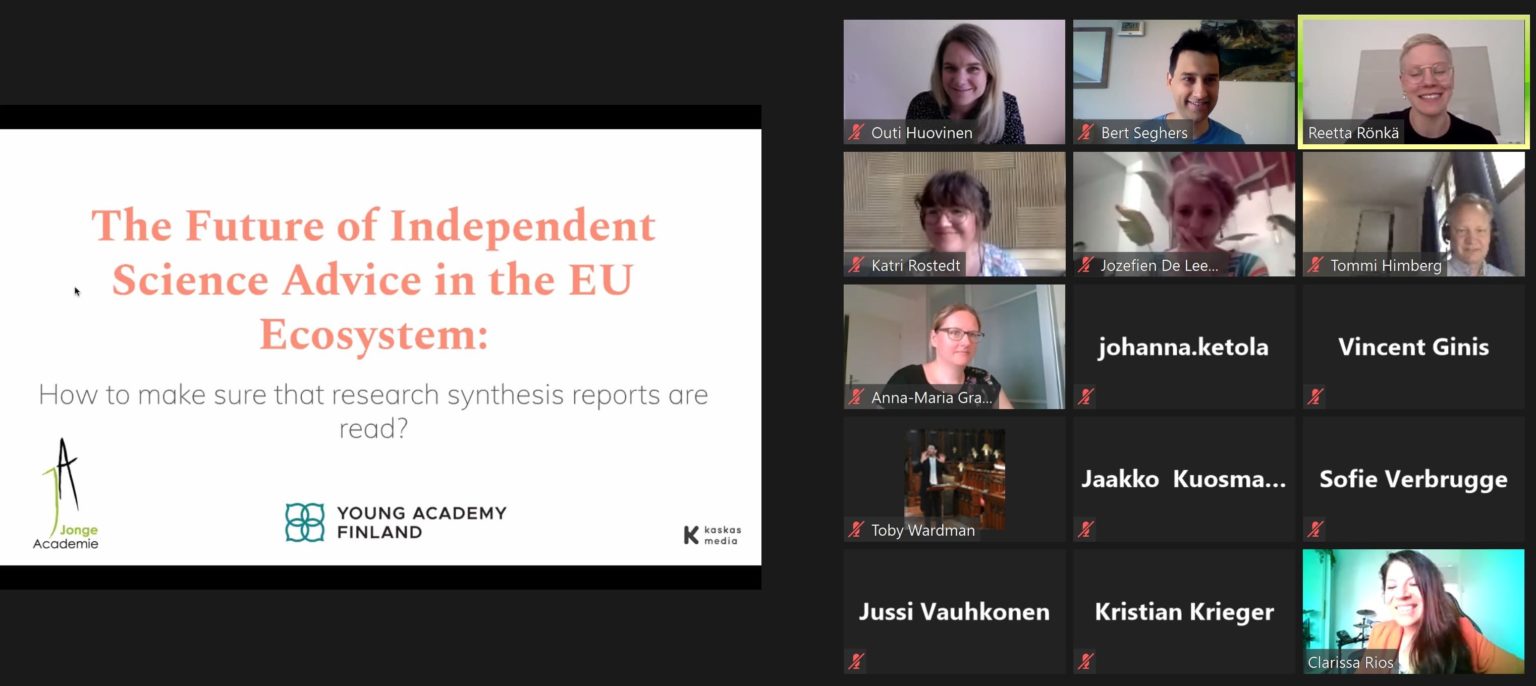On 27 May 2020, the Young Academy Finland (YAF) and the Belgian Young Academy co-organised a webinar on “The Future of Independent Science Advice in the EU Ecosystem: How to make sure that research synthesis reports are read?”. The event was facilitated amd moderated by Kaskas Media, and included participants from young academies, governments, European Union bodies, and universities. For the GYA, Science Advice working group member Clarissa Rios (Peru) and Project Officer Anna-Maria Gramatté participated.
The webinar was part of the YAF’s year-long project on “Young Researchers as Knowledge Brokers“, which looks into science advice activities by young academies in Europe.
Kristian Krieger, Policy Officer at the European Commission’s Joint Research Centre (JRC) delivered the keynote on “EU Science for Policy and its challenges”, introducing the EU science advice landscape, and some of its key players, e.g. the Group of Chief Scientific Advisors, the JRC, and agencies such as the European Centre for Disease Control and European Medicines Agency. Kristian then reflected on the knowledge broker role of the JRC, who works to translate expert knowledge into politically relevant information, based on the principle that regulation needs to be based on the best available knowledge. He also discussed challenges relevant to the science-policy interface, which make it difficult for the science world and the policy world to connect and interact: different mindsets; an overabundance of knowledge; knowledge locked in boxes; uncertainty and risks; as well as misinformation. He stressed that research syntheses form a core element of any science advice, whether at EU or national levels.
A session on the “Plurality of knowledge and stakeholders in science advice mechanisms”,then saw inputs by Tommi Himberg, Finnish Permanent Representation to OECD and UNESCO & a member of YAF; Jussi Vauhkonen, Director of the Academy of Finland; and Tanja Suni, Research Director at the Finnish Ministry of Environment, who was able to explain from a practitioner’s point of view what kind of knowledge is needed to make policy. In times of increasingly wicked problems and conflicting stakeholder interests, simply commissioning a report from scientists was not enough anymore. Instead, multidisciplinary, citizen and indigenous knowledge was needed, as well as a continuous interaction between ministries and researchers, and an open discussion about the uncertainty of the knowledge.
A second session focused on “Synthesis reports as a tool for science advice: How to add the ownership of reports from the policy/stakeholder side without endangering the integrity of research?”, with inputs from Finnish Member of the European Parliament Sirpa Pietikäinen; and Kristien Hens (Belgian Young Academy) together with Vincent Ginis, the Co-President of the Belgian Young Academy, who reported on the activities of the Belgian Young Academy’s working groups on Stakeholder engagement in research (Kristien) and the Science meets Parliament programme (Vincent).
Silvia Polidori, Policy Analyst at STOA, the European Parliament’s Science and Technology Options Assessment Panel, talked about the need for stronger connections between scientists, policymakers and the media, and introduced the work of the recently established European Science Media Hub. The Hub is run as a project by STOA, and focuses on training for journalists, media monitoring, online material sharing on a variety of topics, as well as running networking events in member states.
SAPEA Head of Communications Toby Wardman then briefly explained the European Commission’s Science Advice Mechanism, SAM, and how the Science Advice for Policy by European Academies (SAPEA) consortium as part of the SAM is contributing to science advice in the EU arena. He pointed out that while synthesis reports have an important role to play as part of the science advice mechanisms, complex issues or wicked problems might also need some other methods.
Group discussions on best practices for the interaction between policy-makers and researchers completed the webinar.
Insights gained from the webinar will now go towards the YAF’s project report on “Young Researchers as Knowledge Brokers”.
Twitter: #futureofscienceadvice; @yaf_fi; @JongeAcademie
